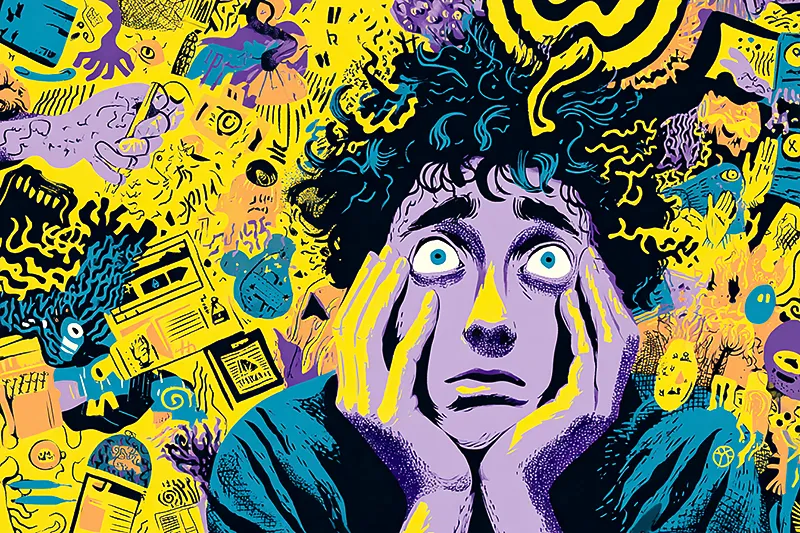🧠 Too Many Tabs Open: How Digital Clutter Affects Your Mental Health
The Invisible Mess: What Is Digital Clutter?
We talk a lot about physical clutter—messy desks, overstuffed closets—but what about digital clutter? All those unread emails, half-finished documents, notification badges, and 72 browser tabs you swear you’ll get to “eventually.”
It doesn’t seem like a big deal. After all, it’s not taking up physical space.
But here’s the thing: your brain processes digital mess the same way it processes physical mess. It registers all those open loops—notifications, unclosed tasks, and half-answered messages—as things demanding your attention. And it doesn’t know which are urgent. It just knows they’re unfinished.
So it keeps you in a constant low-level stress state. Buzzing. Distracted. Foggy.
The Mental Health Impact of Digital Overwhelm
Here’s what happens when your phone becomes a landfill of forgotten tasks and half-read texts:
- Increased anxiety: The brain treats unfinished tasks as stressors. Every red bubble is a micro spike of cortisol.
- Reduced focus: Constant switching between tabs or apps drains cognitive resources, leading to fatigue and irritability.
- Sleep disruption: Late-night scrolling and pinging phones keep your nervous system wired.
- Emotional dysregulation: Overload can make small frustrations feel enormous. Like crying over a dropped file.
In short, digital clutter mimics mental chaos—and then feeds it.
And in a world already spinning fast, that can make it feel like your mind is never allowed to rest.
Why We Let It Pile Up (Hint: It’s Not Laziness)
First, let’s drop the shame. You’re not lazy or “bad at adulting” because your phone is a chaos engine. Digital clutter creeps in for a reason:
- We confuse urgency with importance. Everything pings, so everything feels urgent.
- Dopamine loops: Checking notifications, opening new tabs, or refreshing email delivers little hits of stimulation—until we’re hooked.
- Fear of missing out (FOMO): What if that one unread newsletter changes your life?
- Decision fatigue: We don’t delete or archive because we’re already too tired to choose.
And some of us hold onto digital stuff the way others hold onto old T-shirts—because letting go is hard. Especially when our devices feel like extensions of our brain.
How to Declutter Your Digital Life (and Your Mind)
Think of this as a digital exhale. A way to give your mind a moment of peace by giving your devices some breathing room.
1. One Tab Rule
Only one browser tab open at a time. Radical, we know.
But watch what happens to your attention span when you’re not jumping between 14 simultaneous dopamine triggers. You’ll feel calmer. Focused. Less frantic.
Start small: pick a task. Open only what you need. Close the rest.
2. Unsubscribe with Kindness
Every newsletter you don’t read? A tiny promise you’re breaking with yourself. Hit “unsubscribe.” You can always come back.
Want help? Tools like Unroll.Me or Clean Email make this fast.
3. Declutter Your Desktop
If your desktop looks like a digital junk drawer, take 10 minutes to sort. Create three folders: Keep, Trash, Later. That’s it.
Pro tip: change your desktop background to something calming. Make it a space you actually want to see.
4. Tame Your Notifications
Silence everything that doesn’t feed your wellbeing. Turn off badge counts. Disable push notifications for apps that don’t serve your peace.
Ask: Does this ping love me? If not, mute it.
5. Create Digital “Do Not Disturb” Rituals
Pick one hour a day (start with 30 minutes if you must) where your phone goes away. Like, physically in another room.
Use that time to journal, breathe, draw, dance—whatever reconnects you to you.
(If you’re looking for a soft space to land during that time, Undelulu offers AI-powered journaling and gentle emotional support. No pings. No pressure. Just presence.)
Why It Matters (It’s Not Just About “Productivity”)
This isn’t about being efficient. It’s about being well.
It’s about reclaiming the parts of you that are constantly siphoned off by distractions. It’s about noticing the tension in your jaw after a 3-hour scroll and choosing to close the loop.
It’s about giving your nervous system space to downshift.
Because when the noise clears, something else appears: clarity. The ability to hear your own thoughts. To notice what you need. To make room for joy, rest, creativity—or nothing at all.
Small Steps, Big Shifts
You don’t have to delete everything or go full digital monk. But if your mental health feels frayed, start small:
- One less tab.
- One quiet hour.
- One deep breath before you check your phone.
These aren’t tech tasks. They’re acts of self-respect.
And they matter more than you think.
With fewer tabs and more stillness,
The Undelulu Team
 I closed 37 tabs today. Didn’t finish a task. Didn’t reach inbox zero. But I did feel my shoulders drop, and that’s worth something.
I closed 37 tabs today. Didn’t finish a task. Didn’t reach inbox zero. But I did feel my shoulders drop, and that’s worth something. 